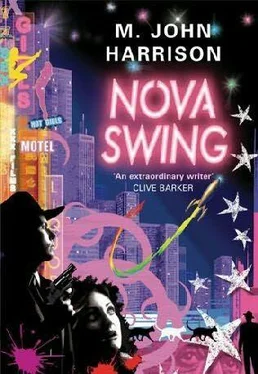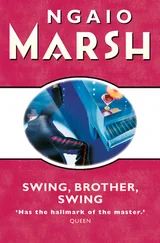When he left an hour later, he was none the wiser. Fake Sandra Shen decor. Standing room only. Overflowing ashtrays, tables littered with screwed-up napkins, half-empty plates and Giraffe beer bottles. The smell of steam from the kitchen. And under the red neon sign, Live Music Nightly, a cheap two-piece to grind out endless bebop remixes of last year's sentimental tunes. You couldn't even get near the toilet for the stream of people coming out. Vic leaned on the bar, listening to the band and shaking his head; then he turned on his heel suddenly and pushed his way to the door. If something was happening there, he didn't know what it was.
He took a rickshaw back into the city and made the girl stop outside the uptown police bureau at the intersection of Uniment and Poe, where Lens Aschemann maintained an office. Past midnight, and damp winds chased wastepaper across the deserted pavement. A single second-floor window remained illuminated. Broken silhouettes came and went against the blind. It wasn't hard to picture Aschemann up there, drinking rum while he methodically pasted Vic into the frame for some scheme Vic didn't even know about. What had Site Crime stumbled over at the Cafe Surf? Paulie DeRaad's EMC connexions, maybe, running an artefact-related operation of their own. But then why put Vic Serotonin in the frame for Paulie's lack of discrimination?
"Hey," the rickshaw girl reminded him, "you pay a horse to run."
"So run," Vic told her.
"You know I got to towel down if I stand around too long. People just don't get that."
"I'm sorry," said Vic.
"Life's too short to be sorry, hon."
Vic paid her off on the edge of a weed-grown lot a few streets away from his rooms in South End, then took the roundabout route home. No one followed him, yet when he got into the hall of his building he couldn't convince himself he was alone. A package had been left for him. When he opened it, he found a small leather-bound book, on the cover of which was a line-drawing of a hand holding some flowers. Though the flowers were all on the same stem, and the same shape, they were of different colours. For a moment, he thought that Edith Bonaventure had found her father's diary and brought it to him. But the handwriting wasn't Emil's, and the first sentence Vic read began, "Am I confused when I remember, or try to, the time before my childhood?" Serotonin stared at this in exasperation, then ran upstairs to his room, where, instead of putting on the light, he stood by the window in the dark and looked down into the street. Ten or twenty yards away on the opposite side, someone looked back at him. It was the woman from Liv Hula's bar, her face blanched by the vapour lamps, framed by the collar of her fur coat. By the time he had forced the window up and shouted, she was gone.
Some hours later, across the city, the man who resembled Einstein let himself into his dead wife's bungalow by the sea.
The front door, swollen with salt moisture, must be lifted as you opened it; sometimes it stuck anyway. Sand feathered across the linoleum in the hall. Rather than switch on the lights, Aschemann paused and allowed his eyes to adjust to the faint sea-glimmer limning every surface. He made his way carefully to the kitchen, where he wiped the window and regarded the ocean. "How are you?" his wife's voice said to him. "You see that ship out there?" It was the kitchen of an empty house, empty cupboards, empty shelves, dust and sand in a thin gritty layer on everything. Aschemann ran warm water from the faucet, catching it in his cupped hands to splash his face. Then he went back down the hall and took off his raincoat.
While he was doing that his wife's voice said, "Can you see the same ship as me, those lights to the right of the Point?"
In life she had constantly asked him similar questions, whether he was standing next to her or lying in bed with some other woman halfway across the city. She had, somehow, never trusted her own eyes.
"I see the ship," he reassured her. "It's only a ship. Go to bed now."
Comforted by this fragment of an exchange the rest of which lay at some inaccessible level of memory, he sat down in the lounge, unbuttoned the collar of his shirt, and dialled up his assistant, to whom he said, "I hope you have something good for me. Because we aren't doing so well since the other day." He knew this was ambiguous. Let it stand, he thought.
After the raid on the Semiramide Club, they had argued in the car. "I don't like to have shots fired," he had informed her. "Now I'll have to apologise to Paulie."
"Paulie is a violent creep."
"Still. Shots fired is not my way. Find nothing and set light to a wall, is that a day's work? Threaten some children! The problem with DeRaad will always be the same. He's never quite intelligent enough for his own good, and never quite stupid enough for ours. That's Paulie." He touched her arm. "And drive slower," he said. "I don't want to lose this nice car. I don't want to hurt someone." She stared ahead, and, if anything, accelerated a little. Moneytown was all round them with rickshaws and pedestrians, the Cadillac embedded in early evening traffic one minute, prised free the next. Stop, start, stop, start: it made Aschemann feel ill.
"They aren't children," she said.
"You're angry, I can understand that."
The Semiramide raid had left him none the wiser. He had expected nothing less-who, after all, would store a proscribed artefact in the back room of a dance club? Not even Paulie DeRaad. Since then, without quite knowing why, Aschemann had returned repeatedly to the Cafe Surf, telling himself, Everything proceeds from there. To watch is best when you have no theory. He tracked his bebop golems into the night, observed their lateral slide and vanishment into the hustle of things in central Saudade. It was like a card trick. One in ten lasted a little longer, going as far, perhaps, as to negotiate for a room. "That must mean something," he told his assistant now. "Ten per cent of them are more than ordinarily restless. They want something. Are they even artefacts as we know them?"
All this, she responded, served only to confirm what he already knew. Aschemann shrugged. "So it's three in the morning," he said, "and I don't understand why you waste your time talking to an old man like me."
"Vic Serotonin walked into the Cafe Surf tonight, half an hour after you walked out. I've been trying to reach you since."
"Ah," Aschemann said.
"I can't report to you when you disconnect."
"I suppose not."
"You disconnect and wander about on your own," she complained. When it became clear he wasn't going to answer that, she said, "We got a little coverage. Would you like to see it now?"
Aschemann said he would.
The house lurched, then vanished from around him. He was looking down a nanocam feed, at jumpy visuals of people in some crowded space. His assistant's voice came in across the top of that, its hollow, reverberant qualities an artefact of the transmission process. She seemed closer, but not quite in the room with him. "Is this all right?" she said. "Only they're routing it down some kind of low priority EMC pipe. Ours are all down."
"The pipe's fine. The material itself is poor."
"They had some technical problems with that too."
It wasn't anything like being there. The image stream wavered, held, dropped suddenly into greyscale while slow bars of black rolled queasily down Aschemann's field of view. You could be the most experienced user, you would still throw up in the end. But there, quite visible, was Vic Serotonin, perhaps eight feet away from Aschemann, propping up the Long Bar at the Cafe Surf with his gabardine jacket open and his hat pushed to the back of his head, while the people around him conversed jerkily or ran fast-forward as if they lived in another world. "It looks as if he was waiting for someone," Aschemann said, shaking his head irritably as if to dislodge something, while his eyes focused and refocused on a spot in the empty room. People often sought to clarify an incoming image this way. You would catch them squinting or banging their temple above one eye, it was a common reaction, which never worked.
Читать дальше












